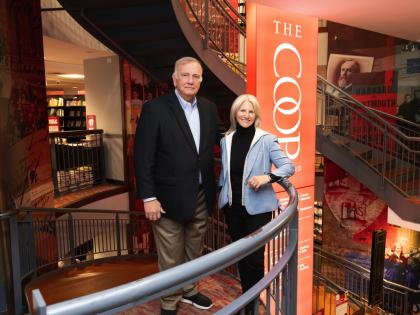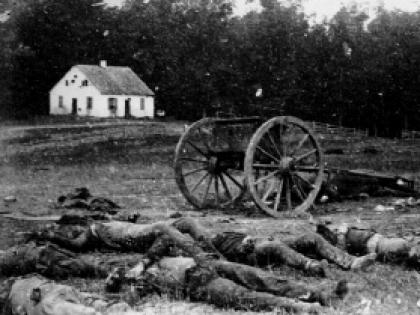Luke Patrick Winston '03 traveled 7,500 miles from Las Vegas, New Mexico, to Harvard, and now on to Santiago, Chile to find his current family, but the one he has settled into is a doozie. Little about growing up east of Albuquerque and Santa Fe, or concentrating in chemistry and physics, prepared him for taking up residence with 43 children at Hogar Esperanza ("House of Hope"), an orphanage at the base of the Andean foothills. Winston's decision to defer graduate study in chemistry to travel and explore what he calls "the human side of the world" has yielded life lessons in abundance.
His patience "has just about quadrupled." The middle son of five boys born in quick succession, he says he's "not used to such younger siblings." Now, while driving children on errands, he routinely finds himself called on to change course to add six two-year-olds to the van's passenger load of four eight-year-olds. Although the 13 youngest residents, from newborns to three-year-olds, live in the "baby house" a few blocks away, the main brick structure, built on farmland leased from a nearby Catholic school, houses 30 older orphans (some now his peers, pursuing higher education) and resident staff and volunteers like Winston. There are battles over homework and other rites of growing up, multiplied nearly three dozen-fold.
Then there is "the loss of personal and emotional space." He bunks with some of the older boys and his possessions, he rapidly learned, are theirs, too. Each child expects his time, around the clock. And emotions are community property, too: "Every time I appear angry, sad, or even happy," he reports, "the entire home must know why."
That emotional intensity helps explain Winston's recent decision to extend his stay another six months, until this coming spring. In a country where one-fifth of the population is ill-housed and very poor, and divorce is not recognized, children end up abused and abandoned. As an example, Winston describes Víctor, 15, who lived on the street for two years caring for younger siblings (with three of whom he now lives at the hogar); Víctor, he says, is stable, mature, responsible. But Pancho, nine, suffered a broken arm inflicted by his parents, was abandoned by them and then by his grandparents, proved unadoptable, and is now dangerously violent.
By helping around the hogar and coordinating volunteers, Winston frees Jorge Daveggio, the orphanage founder, to raise funds, organize one-on-one staff time with each child, and share donations (memorably, 600 kilograms of yogurt) with less well-off facilities.
That's where Winston's other skills come in. He has improved the hogar's multilingual website (www.hogaresperanza.cl), thereby augmenting fundraising (recent acquisitions: a washing machine, bunk beds, and a pool of money which may help pay down the $40,000 mortgage on the baby house). A new on-line venture, www.voluntariosesperanza.org, facilitates volunteer recruiting for this orphanage and six others, where nearly 300 children are cared for. With the first placements just begun in May, Winston decided he needed to stay longer with his extended parentless family. "Jorge dreams just as much as I do," he says. "Especially with all this growing, it's so exciting" to be at home so far from home.
~John S. Rosenberg







